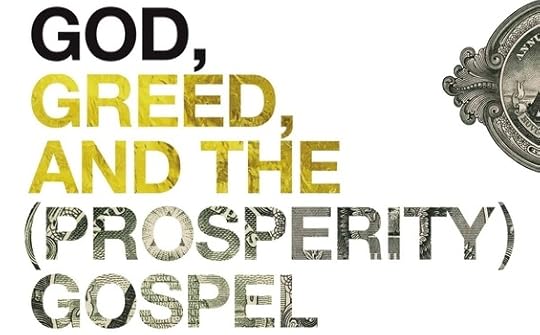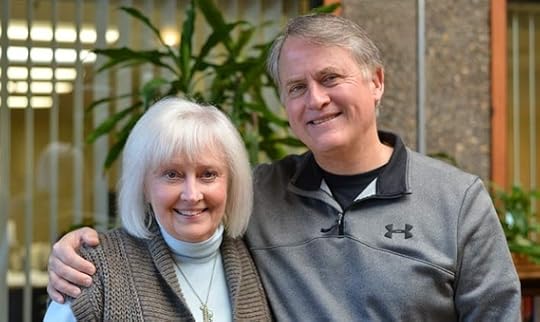Randy Alcorn's Blog, page 99
July 24, 2019
God, Greed, and the (Prosperity) Gospel: A New Book by Costi Hinn, Nephew of Benny Hinn

I just finished reading Costi Hinn’s new book God, Greed, and the (Prosperity) Gospel: How Truth Overwhelms a Life Built on Lies, over a period of three days, including two late nights. I couldn’t put it down! It’s the finest treatment of the health and wealth gospel I’ve ever read. I underlined heavily as I read and went back to it every time I could grab a spare ten minutes. It’s well written, and a very effective blend of personal story and biblical truth.
God, Greed, and the (Prosperity) Gospel: How Truth Overwhelms a Life Built on Lies.
Coming July 9th, 2019. https://t.co/gsMOjlYOsp pic.twitter.com/V0Kzw90GY0
— Costi W. Hinn (@costiwhinn) June 3, 2019
Though I have written about prosperity theology in my books on giving, and many others have spoken out against it, nearly all of us share in common that we are critics who come from the outside of the movement. So sometimes we end up preaching to the choir of those who are already skeptical or hostile toward it. We quickly lose credibility with those on the inside who most need help.
 This is where, by God’s grace, Costi’s story and voice can and will change everything for some readers. It’s an inside story by one who grew up in the Benny Hinn family, lived the opulence, and saw the hypocrisy before being transformed by the one true Jesus and the true Gospel.
This is where, by God’s grace, Costi’s story and voice can and will change everything for some readers. It’s an inside story by one who grew up in the Benny Hinn family, lived the opulence, and saw the hypocrisy before being transformed by the one true Jesus and the true Gospel.
Costi’s book does more than tell stories; it also goes to God’s Word so you can see the conflict between the prosperity theology he was raised in, and what God tells us in His word. This book is gold, in the figurative and more valuable sense of the term. I was really touched by it. Read it!
Here’s an excerpt to give you a flavor of the stories and truth he shares:
Sunday after Sunday, we heard from the pulpit, “God has guaranteed healing! Just have faith and God will do whatever you ask him to do.” So many people had been brought up on stage and declared healed. So many people, but not Uncle George? Only one explanation could satisfy the confusing question that became the elephant in every room we occupied: How in the world did he not get healed?
Soon we were given an explanation for his death. We rationalized that Uncle George (and his family) must have done one or more of the “big four,” which caused him to lose whatever declared healing he was guaranteed. The big four, or a short list of reasons why God didn’t heal people, went something like this:
Making a negative confession: using negatives words about your physical condition would hinder your healing.
Hanging around negative people: allowing the negative words of others about your physical condition would hinder your healing.
Not having enough faith: not believing or giving enough money to prove your trust that God would heal you.
Touching the Lord’s anointed: speaking against or opposing a man of God who is anointed.Turns out, as the story went, that Uncle George and the people around him did all four of these. Most of all, we were told that Uncle George had started to hang around with people who spoke negatively about my father and our church. There was a zero-tolerance policy in our belief system for this sort of thing.
The story I was eventually told is that Uncle George started playing softball on Sundays to try to stay active during his battle with cancer, which was a serious no-no in our legalistic church. When my father confronted him about this, Uncle George did not follow orders and perhaps had a few other opinions as well. Since Uncle George had begun to hang around with negative people who weren’t mesmerized by my father, they had corrupted his life and removed him from God’s favor. While playing softball one day and rounding third base, Uncle George had a stroke and collapsed, doctors could do nothing for him, and he eventually died because he let negative people into his hospital room and into his life. That was the simple explanation.
…Many people left the church over the following years, and if they died any time after leaving the church, they also joined the illustration file of those who had touched the Lord’s anointed. Many others, however, chose to stay, believing that God’s favor and protection were contingent on their staying under my father’s leadership. Throughout the nineties, the same storyline was revealed in my Uncle Benny’s ministry as well. Some of his ex-employees were dying, and others, like my aunt Karen, who had voiced her displeasure with his ministry antics and handling of money, were suddenly struck with illness. All of this served as proof that we were anointed by God. Mess with us, and you’ll be under a divine death sentence.
May God use God, Greed, and the (Prosperity) Gospel far and wide for His glory! (The book is available both on Amazon and Christianbook.com.)
July 22, 2019
A Heart for Prisoners, Lessons Learned in Trials, and 17 Years of Service to EPM: a Q&A with Sharon Misenhimer

Earlier this year, our dear friend Sharon Misenhimer retired from Eternal Perspective Ministries. Her impact on this ministry has been far reaching.
When I started EPM in 1990, I never anticipated God would use our organization to reach so many prisoners with the gospel or help disciple believers in prison. The key to this vital part of our ministry has been Sharon. With her great heart for prisoners, for many years she has handled their correspondence and sent requested books without charge.
Earlier this year, Sharon reported that in just one week we received 375 letters and 331 orders from prisoners, to whom we shipped 498 books. We’re a small ministry, and reaching prisoners isn’t our main focus. Yet more than 30,000 inmates have contacted us! We’ve sent them over 70,000 books, a great investment because each book is typically read by many prisoners.
Heartfelt letters from inmates tell us of conversions, profound life changes, and gratitude for our help. These letters reflect the deeply personal nature of Sharon’s ministry. God has forged precious relationships with many—very few of whom we will meet in this world.
Sharon has been both a giver and a gift, not only to us but to thousands of prisoners. Our ministry to prisoners wouldn’t have existed without her faithful and diligent follow-up with people in need, who are often forgotten. (I’m grateful for our staff member Amy Woodard, who has taken over for Sharon and now oversees this ministry, as well as for our other staff involved with packaging and shipping the books!)
I hope you enjoy the following Q&A with Sharon. It will give you a glimpse into this godly woman’s heart for prisoners and her great love for the Lord. I especially appreciate what she shares about prayer and how God has grown her through trials and difficulties over the years. —Randy Alcorn
Tell us a little about your history with EPM.
I had the privilege of working at EPM for 17 years. I started as a volunteer in 2002 and became part of the staff in 2007 as a Ministry Assistant. I also managed the prison outreach part of the ministry.
How has working for EPM and with Randy affected you personally?
Working at EPM has shaped and blessed my life more than I could have ever imagined and has been one of my greatest privileges.
Randy’s writings and his and Nanci’s influence (by the way they live) changed my thinking and life in many ways. One of the main themes in his writings that has deeply influenced me is living our lives in light of eternity by investing in things that will last forever. Randy reminds us that this life and the opportunity we have is temporary and very brief, and I love his “Live for the Line, Not the Dot” video that powerfully illustrates this message.
What would you like people to know about EPM’s book ministry to prisoners?
Even before I started working at EPM, prisoners were writing to Randy and requesting his books. I’m thankful God gave me a genuine love for the inmates that I’ve served and prayed for over the years; it became the part of my job that I loved the most.
How can others get involved in helping EPM reach inmates for Christ?
If you would like to be a part of this ministry, you might want to consider donating to EPM’s Books for Prisoners Project. These funds will help with the cost of sending out Randy’s books. Another way you can significantly impact their lives is to pray God will use these books to either introduce prisoners to the Savior or draw the believers into a closer walk with Him.
For several years, you prepared a weekly prayer sheet for our staff with requests from around the world. What does prayer mean to you, and how has God grown you in this area over the years?
Prayer is such a great and awesome privilege because we can talk to Almighty God! It’s a vital part of my having a personal relationship with Him. He is a personal God who cares for me and delights in me bringing my hardships, cares, requests, confessions, and joys to Him, as well as my gratitude and worship.
God began working significantly in my life in the area of prayer six weeks after Joe and I were married, when he was deployed to Vietnam. I had never prayed so much in my life. Years later we weren’t able to have children and that is when a long 10-year journey began of infertility, miscarriage, failed medical interventions, and adoption attempts, which brought about a lot of discouragement and persistent prayers. God answered and gave us our own child and a second one after seven more years of infertility. Later in life, the devastation of a prodigal child also had us on our knees, desperate and crying out to God.
Trials are very difficult and painful to go through. But looking back, Joe and I are so grateful for God’s wisdom in allowing trials in our lives to change us. They developed in us a stronger prayer life as well as a deeper trust and dependence on Him. I can honestly say my greatest trials have brought about some of the greatest blessings in my life, and I’m thankful for how God used them to change me. I would not want to be who I was prior to these trials. As we depended on Him in the deep valleys of hardships, we discovered the rich treasures of God’s love, comfort, grace, and intimacy, and experienced His transforming work in our lives.
A couple of meaningful verses during those years were 2 Corinthians 4:17-18: “For our light affliction, which is but for a moment, is working for us a far more exceeding and eternal weight of glory, while we do not look at the things which are seen, but at the things which are not seen. For the things which are seen are temporary, but the things which are not seen are eternal” (NKJV). Through these verses and many others, God helped us to see that He was using our trials for our good and that they were not meaningless. God’s Word helped us to persevere and gave us the strength to keep our eyes on Jesus and on what mattered for eternity.
Now that you’re retired, what will you be doing with your time?
Joe and I are really looking forward to spending more time with our kids and grandkids. We also look forward to doing some camping and traveling.
I remember reading John Piper’s book Rethinking Retirement years ago, about living out our retirement years for a greater purpose than what most people dream of. Even though I’m retiring from my work at EPM, God still has work He wants me to do. My prayer is that He would show me how He wants to use me to love and serve others.
July 19, 2019
The Gospel Flies with the Wings of Grace and Truth

You can also listen to the audio version of this blog.
The Pharisees, God’s self-appointed gatekeepers, never emphasized grace. Christ’s hearers had seen truth in the law of Moses, but it was Christ who gave them their first clear view of grace. The law could only reveal sin. Jesus could remove it.
Some churches today embrace truth but need a heavy dose of grace.
Other churches talk about grace but cry out for a heavy dose of truth.
Some time ago, I invited a lesbian activist to lunch. For the first hour, she hammered me, telling of all the Christians who’d mistreated her. She seemed as hard as nails. I listened, trying to show her God’s grace, praying she’d see the Jesus she desperately needed. She raised her voice and cursed freely. People stared. But that was okay. Jesus went to the cross for her—the least I could do was listen.
Suddenly she was crying, sobbing, broken. I reached across the table and took her hand. For the next two hours I heard her story, her heartsickness, her doubts about the causes she championed. I told her about Christ’s grace.
After four hours we walked out of that restaurant, side by side. We hugged.
In our conversation, truth wasn’t shared at the expense of grace, or grace at the expense of truth.
Birds need two wings to fly. With only one wing, they’re grounded. The gospel flies with the wings of grace and truth. Not one, but both.
For more on this topic, see Randy’s book The Grace and Truth Paradox , and his devotionals Grace and Truth .
Photo by Alina Strong on Unsplash
July 17, 2019
Will There Be Travel on the New Earth?

The following is an edited transcript of my interview with Tony Reinke, who invited me to be a guest on Desiring God’s “Ask Pastor John” podcast a few years ago. You can also listen to the audio.
Tony Reinke: We’re joined again by author and speaker Randy Alcorn, sitting in this week for John Piper. We’re calling it Heaven Week. In Monday’s episode, Randy, you said this: “If there’s a New Jerusalem, why not a New Los Angeles, why not a New Chicago, why not a New Paris, why not a New London?” And so I want to pick up on that today and ask about travel: Will we travel around and leisurely explore the New Earth? Assuming there are cities, will we travel to them? And will we travel to other planets and explore the universe?
Randy: The reality is that the New Earth will correspond to the old Earth in the same way that our new bodies will correspond to our old bodies—a better version of the same, but not fundamentally different except in the sense of perfected, glorified, always healthy, not subject to death and suffering and all of that, because we will no longer be under the curse. Therefore I think the natural understanding would be that travel on the New Earth in the resurrection would be similar to travel as it is now. We can walk. The New Jerusalem has streets. Streets are made for walking. They could also be made for riding horses. There could be automobiles. There could be jet engines and air travel. There could be space travel, all of these things. In fact, there’s no reason at all to think there wouldn’t be. What we see in Revelation 21 and 22 and, for that matter, in Isaiah 60, 65, 66 and other New Earth passages, is that you would expect people to do what they have been able to do—except do it better. Our minds will be better. Our bodies will be healthier.
So will we run? Well, probably faster than we have ever been able to run, not getting tired. Of course, we will still be finite. Some people suggest that they see Jesus in the resurrection appearing suddenly in rooms where the disciples are present and so people speculate, “Well, maybe we’ll be able to do that, transport Star Trek like, without the transporter to another location.” That’s possible, although it’s also possible that’s something limited to Jesus, being the God-man who has a fully human body yet at the same time still has properties of deity that we don’t have. Maybe He’ll be able to do that and we won’t.
But back to the question of whether we would travel someplace, even in space to explore the universe, new heavens and the New Earth. (In talking about the new heavens, we’re not talking primarily about Heaven, the dwelling place of God. We’re talking about the physical celestial heavens, what we think of as outer space.) I remember as a teenager having a telescope and looking at the great galaxy of Andromeda three million light years away and at all these hundreds of billions of stars and thinking: Wow, wouldn’t it be great someday to go there? And then later I became a Christian, and read about the new heavens and the New Earth and thought: Maybe one day I will go there, to the praise and glory of God!
Tony: Well then, what about bucket lists? So many people say, “Before I die I want to see Paris and I want to see Rome, I want to see London.” (I’ve never heard Chicago being on anyone’s bucket list.) If what you’re saying is true, it makes these “bucket list” aspirations seem a bit lame.
Randy: I think the whole concept of a bucket list is entirely understandable for people who believe that this is the only life they will ever live, and that after they die they will no longer exist. Or even for those who believe that after they die, maybe they will still exist, but they will be a ghost forever and won’t have actual bodies. This means that for us as Christians, we should be the last people to think in terms of the bucket list.
Now, there’s a distinction between the bucket list and having some things I would like to do with my wife and family. OK, well, that is fine, of course. But if it is the bucket list in the sense of: “Hey, I’m going to kick the bucket, and this is my only opportunity as a physical person to do things in a physical world”—that’s utterly and completely unbiblical, contradicted start to finish by 1 Corinthians 15 and every passage that speaks of the resurrection and eternal life.
Tony: Fascinating. There’s some food for thought. That’s especially hope-giving for those of us who cannot afford exotic travel destinations. Thank you, Randy. For more on this and so many other topics, see his bestselling book, simply titled Heaven. Also, check out Randy’s ministry, Eternal Perspective Ministries online at www.epm.org. I’m your host Tony Reinke. Thanks for listening to the Ask Pastor John podcast.
Through Thursday, July 18, you can purchase Randy Alcorn’s Everything You Always Wanted to Know About Heaven from EPM for $5 (67% off $14.99 retail), plus S&H. Sale ends Thursday, July 18 at 12:00pm PT (noon).
“Great book on quick points about Randy Alcorn's Heaven book! I plan on giving this book to friends and family that don't read the Bible much so as to help them understand Heaven a little more and expose them to truth concerning God's Holy Scripture.” —Reviewer on Amazon
Photo by William Bout on Unsplash
July 15, 2019
Doesn’t God Being Happy with Himself, and Seeking His Own Glory, Seem Smug or Self-Centered?

In my books and on my blog, I’ve written about the happiness of God. But some might ask, “Humans who are happy with themselves are often considered arrogant and self-obsessed. So how can it be a compliment to say that God is happy with Himself?”
For a time, C. S. Lewis struggled with God’s demand that we praise Him and give Him glory. Eventually Lewis realized that he’d misunderstood the truth:
The most obvious fact about praise—whether of God or anything—strangely escaped me. I thought of it in terms of compliment, approval, or the giving of honour. I had never noticed that all enjoyment spontaneously overflows into praise . . . just as men spontaneously praise whatever they value, so they spontaneously urge us to join them in praising it: “Isn’t she lovely? Wasn’t it glorious? Don’t you think that magnificent?” The Psalmists in telling everyone to praise God are doing what all men do when they speak of what they care about. My whole, more general, difficulty about the praise of God depended on my absurdly denying to us, as regards the supremely Valuable, what we delight to do, what indeed we can’t help doing, about everything else we value. [1]
If God is indeed the primary source of all that’s good and praiseworthy, wouldn’t it be unloving for Him to withhold from us the happiness of praising Him?
Lewis concluded,
I think we delight to praise what we enjoy because the praise not merely expresses but completes the enjoyment; it is its appointed consummation. It is not out of compliment that lovers keep on telling one another how beautiful they are; the delight is incomplete till it is expressed. . . . Fully to enjoy is to glorify. In commanding us to glorify Him, God is inviting us to enjoy Him. [2]
Remember, what’s for God’s best is ultimately for our best too. God says, “For my name’s sake I defer my anger, for the sake of my praise. . . . For my own sake, for my own sake, I do it. . . . My glory I will not give to another” (Isaiah 48:9, 11). A human being who repeatedly says “for my own sake” demonstrates selfishness. But we didn’t create the universe. When people seek glory for themselves, it rubs us the wrong way because they aren’t worthy of that glory. It’s different with God: He is worthy of all the glory—more worthy than we can possibly comprehend.
When an audience gives a standing ovation after a concert, don’t we expect the composer, the director, and the orchestra members to be happy? And doesn’t the fact that the performers find happiness in the audience’s happiness—which is so great that they erupt into spontaneous praise—negate the idea that the performers are selfish? Is it selfish to want to make people happy? Similarly, why should it disappoint us that God would be happy to receive the praise that makes us so happy when we offer it to Him?
The doctrine of the Trinity explains how God can appropriately be God-centered. First, because He’s worthy. Second, because He properly exalts what’s worthy. Third, because in delighting in the other members, each person of the Trinity is others-centered. The Father is Son- and Spirit-centered. The Son is Father- and Spirit-centered, and the Spirit is Father- and Son-centered.
God’s desire for us to please Him is not only for His good but also for ours. Spurgeon said, “The chief end of man . . . in this life and in the next, is to please God, his Maker. If any man pleases God, he does that which conduces most to his own temporal and eternal welfare. Man cannot please God without bringing to himself a great amount of happiness.” [3] John Piper says, “God is the one being in the universe for whom self-exaltation is not the act of a needy ego, but an act of infinite giving. The reason God seeks our praise is not because he won’t be fully God until he gets it, but that we won’t be happy until we give it. This is not arrogance. This is grace.” [4]
Excerpted from Randy's book Happiness.
[1] C. S. Lewis, Reflections on the Psalms (New York: Harcourt, Brace, 1958), 93–95.
[2] Ibid., 95, 97.
[3] Charles H. Spurgeon, “Faith” (Sermon #107).
[4] John Piper, “Is Jesus an Egomaniac?” Desiring God, January 4, 2010.
Photo by Carolinie Cavalli on Unsplash
July 12, 2019
Freedom from the Tyranny of the Phone

For years, when my daughters were young and I was a pastor, I lived under the tyranny of the telephone. I treated the ringing of the phone as a divine mandate, and I missed too many dinners and bedtime prayers with my daughters because of that phone—no, actually because of my choice to answer the phone.
Finally I discovered something that changed my life: phone calls are seldom from Mt. Sinai. There are few true emergencies and it won’t hurt people to wait an hour or a day for me to call. When my daughters were growing up there weren’t cell phones, and one of the best things about going out for the evening as a family was that nobody could reach us! We can do the same thing now—but it requires silencing the phone. You don’t have to see who’s calling, texting, tweeting, Facebooking, or…fill in the blank. In fact, if you do, you’re saying they are more important than the people you are with. “Wherever you are, be there.”
Nanci and I learned over thirty years ago that the phone is our servant, not our master. By God’s grace that lesson stuck. Sure, we still get calls during dinner. We just don’t answer them! And we are guilt-free, because we know it’s what God wants. (The messages come in, and if it’s important we’ll pick up. But guess what—it’s almost never important enough to interrupt dinner!) Looking back, I’m amazed and embarrassed that until I was thirty I let that piece of technology disrupt me and my family. All because I didn’t take control. Thank you, Lord, for waking me up when you did!
Excerpted from Randy and Nanci Alcorn’s book Help for Women Under Stress.
Photo by NordWood Themes on Unsplash
July 10, 2019
Seeing Jesus: The Happiest-Making Sight

Ancient theologians often spoke of the “beatific vision.” The term comes from three Latin words that together mean “a happy-making sight.” The sight they spoke of was God. To see God’s face is the loftiest of all aspirations. But sadly, for most of us, it’s not at the top of our list of desires.
Wayne Grudem writes in his Systematic Theology:
When we look into the face of our Lord and he looks back at us with infinite love, we will see in him the fulfillment of everything that we know to be good and right and desirable in the universe. In the face of God we will see the fulfillment of all the longing we have ever had to know perfect love, peace, and joy, and to know truth and justice, holiness and wisdom, goodness and power, and glory and beauty.
The most astonishing sight we can anticipate in Heaven is not streets of gold or pearly gates or loved ones who’ve died before us. It will be coming face-to-face with our Savior. To look into Jesus’ eyes will be to see what we’ve always longed to see: the person who made us and for whom we were made. And we’ll see Him in the place He made for us and for which we were made. Seeing God will be like seeing everything else for the first time.
I sometimes ponder what it’ll be like to see Jesus, to fall on my knees before Him, then talk with Him and eat with Him and walk with Him as a resurrected person living on a resurrected Earth. Like Job I’m struck with the realization that “I myself will see him with my own eyes—I, and not another. How my heart yearns within me!”
I try to picture what this will be like in my novel Edge of Eternity, when the main character, Nick Seagrave, at last gazes on Jesus Christ:
The King stepped from the great city, just outside the gate, and put his hand on my shoulder. I was aware of no one and nothing but him. I saw before me an aged, weathered King, thoughtful guardian of an empire. But I also saw a virile Warrior-Prince primed for battle, eager to mount his steed and march in conquest. His eyes were keen as sharpened swords yet deep as wells, full of the memories of the old and the dreams of the young.
Shut your eyes and imagine seeing Jesus for the first time. What a wondrous thought! And what a wondrous promise!
Excerpted from Randy's book Face to Face with Jesus.
Right now, you can purchase one copy of Randy Alcorn’s Face to Face with Jesus devotional from EPM for $8.99 (retail $12.99) and get a second copy of Face to Face with Jesus free! No code necessary. No limit to number ordered. Your free book will be automatically added to your cart.
Offer ends Thursday, July 11 at 12:00pm PT (noon)
“I’m 74. So I’ve read a whole lot of good books. This book is more than good. It is powerful and full of life. I love the way he uses scripture and quotes from Christian leaders and writers to dig deeply into Jesus, the Son of God. It’s as casual as you want, or as in-depth as you make it. I will read, and re-read this wonderful book, I’m certain of that.” —Reviewer on Amazon
Image by Ben White from Christianpics.co
July 8, 2019
Abortion and Our Souls: Responding to Pro-Choice Logic

Today’s blog was written by my son-in-law Dan Franklin, who is married to my daughter Karina. Dan, teaching pastor at Life Bible Fellowship in Upland, California, is a great communicator, and if you follow my blog, you probably know I like to share posts from him from time to time.
Thanks, Dan, for speaking up for the unborn and helping the rest of us know how to speak up and engage others in conversation about abortion.
Many of those we talk to have vested interests in abortion. They’ve either had one themselves, or have advised another—perhaps a friend, wife, or daughter—to have one, or have aided them in doing so. We need both grace and truth as we address abortion. Before we can speak the truth in love, we need to recognize what is true and what isn’t. That’s what this article is about. —Randy Alcorn
The subject of abortion has long been close to my heart. This is first and foremost because I believe it is a matter of life and death for a vulnerable baby. I believe every abortion kills a human being created in the image of God. Secondarily, though, the subject of abortion is close to my heart because I believe that when we champion and defend abortion, we sacrifice a bit of our souls. I think this is true of us as individuals and also as a nation. How we treat our most vulnerable says something powerful about our souls. This is true when it comes to mistreating people because of their race, their gender, their economic status, and their capabilities. It also applies to abortion because the practice of abortion says we will take it upon ourselves to remove another person from the planet because they inconvenience us.
Since the subject of abortion is prominent in the news once again, I want to lay out some responses to the most common pro-choice arguments that I hear. My intention here is not to straw-man anyone. It is simply to share responses to arguments that, to many, appear to be air-tight. I do not see them as air-right at all. I see them as arguments that are pretty easily answered from a pro-life perspective.
“This is a war on women.”
No, it isn’t. Simple facts say otherwise. Polls consistently show that women in the United States are split down the middle on this question. About half are pro-life and about half are pro-choice. It is simply factually inaccurate to spin this as a bunch of men making decisions in order to disadvantage women.
As another note on this, there are more women who vote in the United States than there are men who vote. If this was simply a war on women, then women could easily turn the tide on this. But many, many women in the United States ardently oppose abortion.
“This is about bodily autonomy.”
No one in the United States has complete bodily autonomy. I cannot trespass on someone else’s property. If I was being removed after trespassing, it would not be valid for me to shout that I have the right to do whatever I want with my own body. I don’t have that right. I don’t have the right to assault others, rape others, throw objects at others, or take other people’s property. I have to control my body and obey laws. No one has complete bodily autonomy.
Of course, pregnancy is a unique situation. The baby is growing in the mother’s body. The baby has a huge impact on the mother’s body. Pregnancy is an amazing thing. This is why pregnant women often have friends and family who help out during those nine months. The baby has a big impact on the mother’s body.
But the baby is not the same as the mother’s body. The baby is not a part of the mother’s body. If it was, then the mother would suddenly have four legs, twenty fingers, two heads, and—perhaps—a penis.
The Keep-Your-Hands-Off-My-Body slogan is disingenuous. No pro-life person wants to keep any woman from making decisions about what she wears, what she eats, whether she has her appendix removed, or whether she exercises regularly. This is not about men—or other women—trying to control a woman’s body. This is about trying to protect the life of the young man or woman in the womb.
“What about when the mother’s life is at risk?”
I know of no pro-life advocate who doesn’t see this as an exception. We can move on.
“What about in cases of rape?”
Rape is, of course, horrific. Rapists should be arrested, convicted, and imprisoned. This is hardly a controversy in our culture. There is near-unanimity of the wrongness of rape.
But a baby conceived through a rape is still a baby. In fact, there are men and women walking around today who were conceived through rape. Should they have been killed because of the evil actions of someone else? I don’t believe they should have been.
When a woman becomes pregnant because of rape, I think her family, her friends, her church (if she has one), and her community should all gather around her, support her, and help her in any way they can. I think they should champion her as an amazing woman who treasures life enough to be willing to bear that baby and then make a choice about adoption or mothering.
It is clearly a situation in which the mother is a victim of evil. This doesn’t make killing the baby a good solution.
And, to be fair, abortions that are performed in cases of rape make up less than 1% of all abortions. So, my question to the person who brings up cases of rape is this: “Are you willing to say that rape—and the life of the other—are the only cases when abortion should be made available?” The answer is almost always, “No, I think a woman should always have the right to choose.” In that case, then it is not helpful to bring up the “exception” for rape. If pro-life people made this exception, it would clearly not appease those who demand full abortion rights.
“But having the baby will ruin the mother’s life.”
Having the baby will certainly impact the mother’s life. There is no question about that. The mother will, in some cases, have to quit school or find a different job. This is 100% true.
But no person’s career or education is more important than the life of a human being created in the image of God. If I get caught embezzling at work and someone is going to expose me so that I will face termination and imprisonment, I don’t get to kill that person. As painful as the consequences of my actions would be, I would need to accept them.
And I absolutely reject the idea that a baby ruins the life of a parent. People consistently experience the joy of children even when they are unplanned and incredibly inconvenient. In fact, in many of those cases, mothers talk about how glad they are to have their child, despite the fact that the pregnancy was unplanned and inconvenient.
“Abortion is legal.”
Yes, this is true. This is a strange argument, but it comes up fairly frequently. The argument goes something like this, “Well, abortion is legal and therefore women should have a right to choose it.” Yes, abortion is legal. But this argument seems to assume that if something is legal then it is therefore good or moral. Slavery was once legal. That didn’t make it moral. No pro-life person is arguing that abortion is not legal. Many of us are arguing that it should not be legal because it is immoral.
“A woman should not have to have a child if she doesn’t want one.”
We all have to face things that we don’t want to happen. Sometimes we have expenses because of health problems. But we don’t get to say, “Yes, I broke a law, but I shouldn’t have to deal with a fine.” Just because a thing is unwanted does not mean that we have a right to reject or avoid it.
A married man has a legal right to have an affair. But he does not have the right to have an affair and then expect that this will not have consequences for his life and marriage. Similarly, a woman could save sex for marriage, which would make her far less likely to end up with an unwanted pregnancy. But she also has the legal right to have sex outside of marriage, and even to have casual sex with as much frequency as she can manage. But she doesn’t have the right to expect that there will be no consequences for this. And it is immoral to kill a baby simply because he or she doesn’t fit into our plans.
I don’t at all presume that this article solves all problems—or even that it convinces a great number of people to change their minds on abortion. But those of us who are pro-life need to be willing to use our voices for the sake of precious unborn children, and also for the sake of the soul of our nation. Abortion is not a victimless crime. It kills not only a baby, but also a piece of our own souls.
Browse more prolife articles and resources, and see Randy’s books Why ProLife? and ProLife Answers to ProChoice Arguments.
Image by Victor Ramos from Pixabay
July 5, 2019
Seek the Giver, Not the Gift?

The idea that we should seek the giver, not the gift, has truth behind it, but it can be misleading.
Suppose I said to my wife, “Nanci, I love you. Therefore I will not love the meals you cook, the books you gave me, the Christmas presents from you, or the vacation we went on.”
Would that make any sense? No. If I love gifts and vacation more than I love Nanci, that would obviously be wrong. But as long as she is foremost in my mind, by loving the meal Nanci prepares and the books she gives me, I honor her. So it is with God.
I can appreciate and enjoy a bike ride on a beautiful day, fully aware that the pure pleasure of it is God’s gift to me. By enjoying it, I’m enjoying Him.
Many believers have overspiritualized church, preaching, and prayer, and in doing so they have distanced God from creation, pleasure, and happiness. “Seek the giver, not the gift” can be an apt warning against idolatry in certain contexts, but as a general rule, it’s misguided.
What we should say instead is, “Seek the giver through the gift” or “in the gift.” Nanci and I are right to thoroughly enjoy the wonderful meals we have with four close friends on Thursday nights. We’re aware that our friends and the food, and our capacity to enjoy both, are God’s gifts to us. By enjoying these gatherings, in which we often speak of him, we are enjoying our Lord.
French Reformer John Calvin (1509–1564) wrote, “In despising the gifts, we insult the Giver.”
Scripture commands us to “earnestly desire the greater gifts” (1 Corinthians 12:31, NIV). But desiring God’s gifts does not mean we must value the gifts above Him.
Dissociating God from His gifts isn’t the solution; it’s the problem. Instead of viewing God’s gifts as demonic temptations, we should view them as benevolent extensions of His love and grace. His gifts to us are not gods—but they are God’s.
As long as we see God in His gifts to us, we need not be suspicious of them. We need not feel shame because they make us happy—they are simply doing what he designed them to do.
God is the primary source of all happiness. He has filled the world with secondary sources of happiness. They are all tributaries that can be traced back to the roaring rivers and boundless oceans of God’s own happiness that He will reveal for His children throughout eternity (see Ephesians 2:7).
God Himself is by far the greatest gift. As long as we see God in His gifts to us and thank Him wholeheartedly for them, we need not fear we’re appreciating them too much.
This blog is excerpted from Randy’s book Does God Want Us to Be Happy?, which is available for preorder from EPM (releases August 6, 2019).
Does God Want Us to Be Happy? offers a collection of short, easy readings on one of life’s biggest questions: in a world full of brokenness, is happiness a worthy pursuit for Christians?
Photo by Jeremy Cai on Unsplash
July 3, 2019
Learning to Be Content and Trust God in Any Circumstances

Each phase of life is different, with its own challenges but also its own rewards. The way to contentment is to trust God’s purposes in our present circumstances. For many of us, there’s major uncertainty about where we will be or what we will be doing a few months from now or even tomorrow.
Contentment must be learned. God is our teacher and source of contentment: “I know what it is to be in need, and I know what it is to have plenty. I have learned the secret of being content in any and every situation, whether well fed or hungry, whether living in plenty or in want. I can do all this through him who gives me strength” (Philippians 4:12-13).
Paul wrote this from jail, and that he could say he was content in unjust imprisonment and without many material goods tells you something about his trust in the all-powerful God who was his source of strength.
Scottish theologian Sinclair Ferguson writes, “Christian contentment…is the direct fruit of having no higher ambition than to belong to the Lord and to be totally at His disposal in the place He appoints, at the time He chooses, with the provision He is pleased to make.”
When my wife Nanci was going through cancer treatments last year, we had to purposely look to King Jesus for contentment. In some moments we felt 100% content. Then in other moments we were fortunate to feel 50%, if that. But regardless of what I feel in any moment, or what you feel, God is 100% in control, trustworthy, and loving.
May we trust Him and be content with what He’s doing, even when we don’t know what that is. That’s faith.
“The righteous shall live by faith” (Romans 1:17).
“We walk by faith, not by sight” (2 Corinthians 5:7).
Browse more resources on the topic of trials and suffering, and see Randy’s related books, including If God Is Good.
Photo by Priscilla Du Preez on Unsplash



